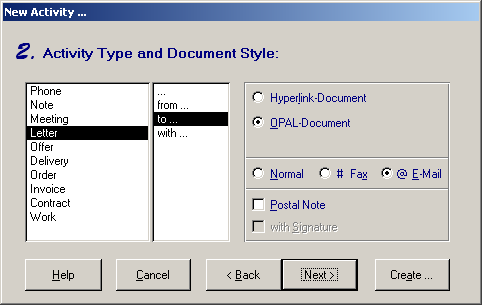




Free ...
Approved aid and refugee
organisations can apply for a free license for OPAL. Just think of the many
addresses refugees might have until they find a new home.
Free for me?
Please contact
us, if you would like to use our services or OPAL for a good purpose. We are
happy to assess and
consider your request.
| |
|
|
|
3. Activities and Documents
|
|
|

|
With the OPAL document management each document is stored only once as an
activity. An activity in OPAL can be any kind of document, note, pending file,
etc. Each activity (document) is linked to all related organisations, persons
and projects. By this means the document appears automatically in all relevant
dossiers. That applies to any kind of documents as well as to mail merge
letters, which can be created automatically with various options (for details
see the next chapter "Mailing Letters").
With various views and filters OPAL provides a complete overview of all
activities, pending files, notes and documents of any type (incl. faxes, e-mails
and personalised mailing letters). You can view the activities of an selected
person or project as shown in the dossiers below, and you can view all
activities in the database. You also can view only those activities which are
related to your user code (dossier of the user code) or those activities which
had been created by your user code. In addition various filters and options are
available. Confidential activities are only visible to the owner and hidden to
other user codes.
Click the image to see the other pages of the
assistant for new activities (and the notes below).
|
 |
|



 |
|
All Selection list definitions can be fully customised and translated. For
example the activity-types (letter to, letter from, phone call, note, meeting
with, offer to, contract with, etc.) and the address-types (headquarter, office,
warehouse, residence, holiday, etc.) can be defined according to the individual
requirements.
OPAL manages externally stored documents in all popular file formats (option
Hyperlink-Document in the image above) and additionally offers the possibility
to create OPAL-Documents, which are stored internally in the OPAL database.
Compared with common text processing systems OPAL-Documents need about 80%
less memory on the hard disk.
|
| |
 
 |
|
|